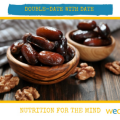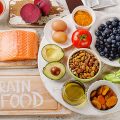Today, we talk about food in agreement with the adage- “You are what you eat.”
Homeostasis refers to a state of balance between the mind and the body. We sleep, eat, move, and perform a number of functions adequately to maintain stasis. Any kind of imbalance results in stress. The activities we engage in regularly act as tools that help in maintaining overall health and well-being. Nutrition is just as important as sleep or movement, if not more. Today, food is our tool, a tool that guides us towards navigating better and improved health.
There is an established and commonly understood connection between food intake and the effect on physical health. Proper and balanced consumption has shown to reduce bloating, blood pressure levels, the risk of diabetes, cancer, and cardiovascular diseases. It also keeps one’s digestion and appetite in check. Food builds our brain-body. From the bulk work of continuously nursing our movements, breathing, senses, pulse even while asleep, the brain refuels with energy absorbed from the food. Nutrition has been linked to better cognitive functioning, improved moods, and emotions.
Neuro-nutrition and behavior
Does nutrition impact brain health? Rapidly growing fields of nutritional psychology and psychiatry are unfolding relations between food and emotions. What is fascinating is that it also affects how we act and behave! An irritated gut sends signals to the brain, thereby affecting mood, thinking, and memory. Listen to and observe that gut feeling attentively. High consumption of junk and processed foods like sweet drinks and salty snacks are correlated with higher levels of aggression.
Our bodies haven’t been dealing well with our eating habits. Studies by Felice Jacka depict that the mother’s diet during gestation affects the child’s mental health. In an experiment, rats deprived of the ‘good’ fats (omega-3 fatty acids) experience higher levels of stress and anxiety. Food and Crime: Young prisoners who were given a rich meal showed a dramatic fall in aggressive behavior as reported by supervisors in reduced incidents and solitary confinements.The cannibalistic hamster: 80% of hamster mothers with a vitamin B-3 deficiency devoured their own babies a day after birth who otherwise nursed their babies well when provided with supplements.
Does food influence thoughts and decisions?
Yes! According to a study by Dr. Soyoung Park, individuals were more tolerant of unfair offers having had a protein-rich breakfast in contrast to those who had a high-carbohydrate breakfast. What we eat, within hours, alters the chemistry of our brain. This, in turn, affects the communication between neurons. Sweetened beverages, fried foods, refined carbs, etc cause inflammation that negatively affects the blood-brain barrier. Consequently, microglial cells (ideally responsible for removing damaged and dead neurons) start devouring healthy neurons and disrupting neural networks. Do you think a rich meal practice could be effective in coping with depression?
Snacking and Satiety
On introducing cheap fast-food and readily available supermarket foods like cakes and biscuits to rats researcher Margaret Morris observed the following:
- Their food rations doubled
- The rats were never satiated
- There was impairment in spatial memory and damage to the hippocampus.
This ready-made food type is a model of the western world food-environment that most of us live in today. Poor food habits significantly affect the hippocampus and interfere with daily functions like learning! A food culture swaying towards cheap fast food and easy-to-make items that supply instant gratification is concerning. Dr. Serge Ahmed studied the addictive pull and irresistible desire for sugar. Results show that a rat chooses sugar syrup four times(4x) more than hard drugs like cocaine and heroin. Glucose overdose is real y’all!
Prof. Eric Stice shows how habitual consumption of diets too-rich in sugar messed the reward circuitry of the brain and reduced the sense of pleasure from it. He shows that regular intake of energy-dense food alters your neural circuitry exactly the same was drug abuse does. Following this, the brain has shown to become hypersensitive to images of food i.e. feeling activated when you see such food in an ad or a glancing at a poster while driving by. This hypervigilance stimulates the brain to eat even in the absence of hunger, ultimately instilling unhealthy eating habits. No wonder we feel caught in the perpetual cycle of cravings!
Spicing it up the traditional way
Do you think a rich meal ritual could be effective in helping with depression? Spices used in traditional Indian medicine are now being studied for their benefits on mental health. We’re only beginning to uncover the wonders.
Clove carries anti-inflammatory properties that have shown to relieve disturbed digestive tracts and indigestion. With its anti-oxidant and anti-depressant properties, saffron has been used to deal with depression and boost memory. Apart from fighting tooth decay with its anti-bacterial properties, nutmeg is also being tested to help fight Alzheimer’s disease. Research shows that ginger lowers the severity of motion sickness and nausea. Cinnamon acts as a rich source of the antioxidant manganese. It has shown to improve motor function in individuals with Parkinson’s and delay cognitive impairment in rats. Its scent has proven to enhance several types of memory tasks. Turmeric is considered as the most promising target in reducing depressive behavior and has anti-anxiety effects.
It is vital to consume them in moderation and with due care. Being your own doctor is not prescribed. They may interfere with the processing of drug medication if consumed in excess.
Put that on your plate!
The secret to efficient functioning is to avoid deficiencies in vitamins, minerals, and proteins. Vegetable oils, seeds, and nuts like almonds are rich sources of omega-3 for us. The Mediterranean diet intrigues scientists because of the varied plants, leaves, and different colored vegetables, not to forget the olive oil! Red fruits and berries might be able to rejuvenate declining neurons. Closely observe how different food-items make you feel, not just instantly but over the next few hours, the next day. Let’s use food to serve us. A balanced, diverse diet that does without processed food and sugar and favors fruits and vegetables, so far appears to be the best recipe for preserving mental faculties.
















No Comments
Leave a comment Cancel